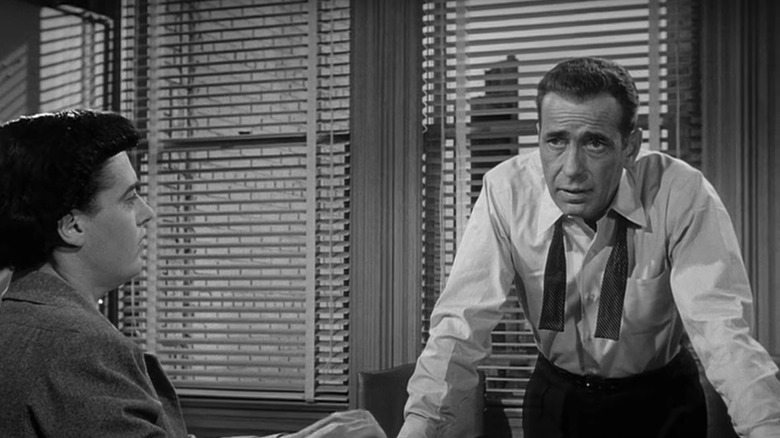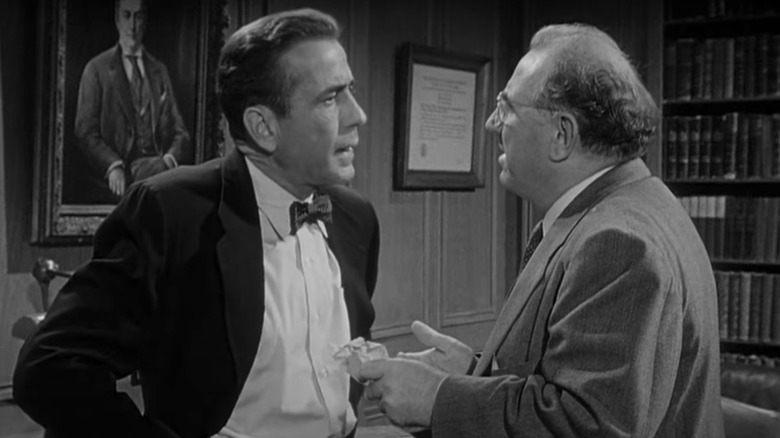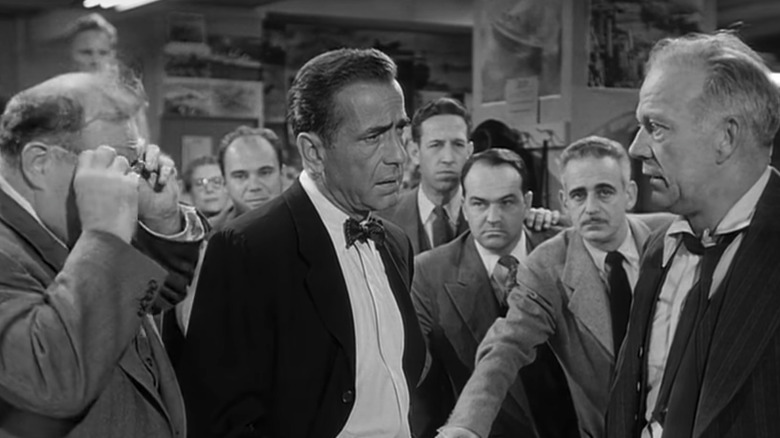Deadline U.S.A. Proved More Demanding Than Humphrey Bogart Expected
Humphrey Bogart was the type of smooth leading man that made film noir great. I've said it before, I'll say it again: whenever you watch his movies, he always seems to ooze a kind of tough coolness. Maybe it's no surprise — the actor was allegedly just as nonchalant and quick-witted in real life. But there's one movie in particular that feels like a bit of a letdown from the good ol' Bogart routine: "Deadline — U.S.A."
Released in 1952, just a few years before Bogart's career would be tragically cut short, "Deadline — U.S.A." has all the makings of a great Bogart noir, at least on paper. As a newspaper committed to hard journalism suffered through its last days, editor-in-chief Ed Hutcheson (Bogart) tried to take down an untouchable mobster and save the paper. It's full of "Maltese Falcon"-style opportunities to banter with the bad guys, but somehow, Bogart's delivery just fell flat. To be fair, Ed's rather stoic demeanor was somewhat fitting — the character was simultaneously mourning serious journalism and his failed marriage — but it was still shocking to see one of the newspaper's reporters, Mrs. Willebrandt (Audrey Christie), nail the signature Bogart wit better than the leading actor did (plus, she brought a fun little drawl to the mix).
Unfortunately, things weren't much smoother behind the scenes, either. Both Bogart and director Richard Brooks were notoriously difficult, leading to conflicts all throughout the shooting process.
Quiet on set!
When watching "Deadline — U.S.A.," it's easy to feel as though Bogart's performance is really inconsistent. He might seem determined to win his ex-wife back at one moment, but a few minutes later, he almost looks totally apathetic. As it turns out, his behavior on set was just as troubling. According to the Bogart biography "Tough Without a Gun," the actor was far from pleasant on set. Brooks complained that Bogart was "withdrawing" and "impatien[t]." Likewise, professionalism went out the window:
"On one occasion Humphrey was obviously hungover. He came to the set unprepared – a lapse unseen since his Broadway days – continually blew lines, and then blamed the script."
Bogart had always been a heavy drinker and had a particularly excessive drinking spell just before he appeared in "The Petrified Forest," his big Broadway break. However, as he began to get increasingly steady work, he made it a point to minimize drinking on the job. Since the actor was known for being able to hold his alcohol, his drinking rarely posed a problem on sets, making his "Deadline — U.S.A." troubles all the more unusual.
As for the actor's side of the story, Brooks allegedly wasn't much easier to deal with. As the biography "Bogart: A Life in Hollywood" would detail, the director would change his mind last minute and frequently lose his temper. It's no wonder that filming "Deadline" would be more difficult than originally anticipated.
Bogart vs. Brooks, round 2: Welcome to the circus
It's no secret that Bogart appreciated being in company that could keep him on his toes — case in point, his third marriage with Mayo Methot was so chaotic that the pair were nicknamed the Battling Bogarts. And despite the tensions between the actor and Brooks on set, Bogart would collaborate with the director again, too: his next role would see him play Major Jed Webbe, a military doctor, in Brooks' "Battle Circus."
Unfortunately, if Bogart was looking for peace on the set of "Battle Circus," he didn't find it. Instead, according to "Humphrey Bogart: The Making of a Legend," the actor managed to accidentally light his hand on fire, a little detail that Brooks kept in the film because it "was the most exciting thing in the movie." The director even praised the footage for showcasing "real pain" rather than "fake pain." Yikes.
By the time that filming had ended, Brooks and Bogart's patience seemed to be wearing thin. "The Making of a Legend" described the pair as friends, but also acknowledged that Bogart told the director that they shouldn't make movies together anymore. Given the excitement that seemed to follow the pair on set, the decision was probably prudent.


